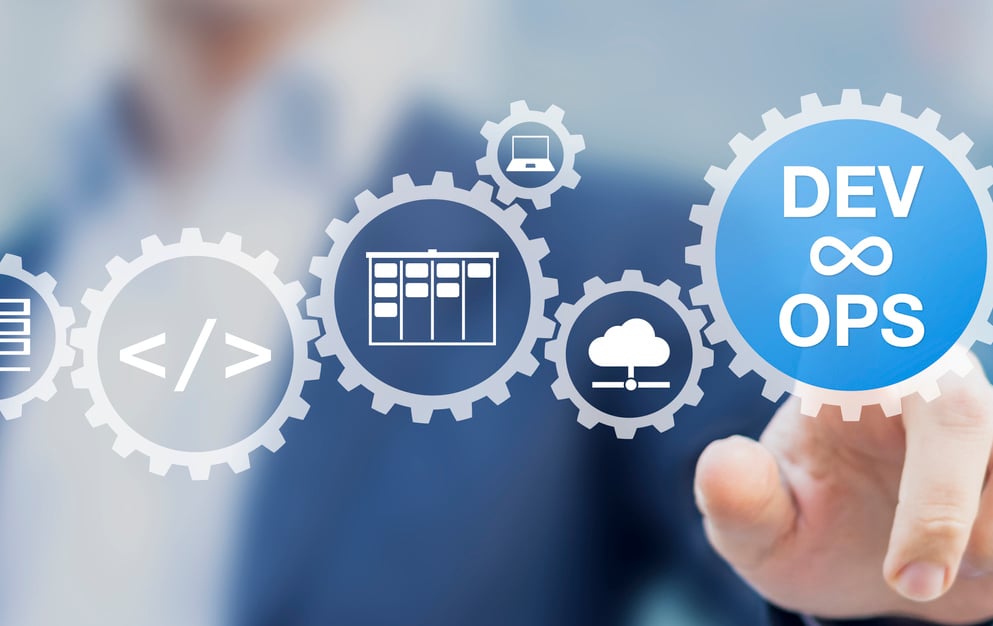DevOps has changed the way software teams work and created a whole development culture around it in recent years. One of the backbone roles of DevOps-based development is the DevOps Engineer. It’s not surprising then, that DevOps Engineer jobs are in high demand.
99% of businesses adopting DevOps strategies and creating DevOps-based teams have seen a positive impact on their development efforts. DevOps Engineers are integral to achieving the increased rates of deployment and shorter lead times DevOps promises. However, 64% of businesses say finding sufficiently skilled DevOps professionals is a major challenge.
Why are DevOps Engineers in demand?
With businesses becoming more digital, competition for skilled tech talent is growing. This is being exacerbated by the increasing adoption of Cloud-based SaaS and PaaS solutions worldwide. As Cloud and edge-computing technology advances, demand for faster, more efficient development cycles also grows.
While essential to optimizing and scaling efficient operations, DevOps Engineers are one of the harder positions to fill. DevOps Engineer jobs are especially demanding, often requiring skillsets that blend extensive experience in software development with technical proficiency in DevOps methodologies and tools.
What do DevOps Engineers do?
DevOps Engineers are key drivers of developmental efficiency and work to support adherence to DevOps principles of automation, communication, collaboration, and knowledge sharing. They facilitate continuous integration and continuous delivery (CI/CD) practices in development.
DevOps Engineers ensure that the entire development process is fast and productive. They must be proficient in a wide range of tools and IT processes. Some of the key areas they add value in include:
- Managing development and release pipelines
- Automating tasks throughout the CI/CD pipeline
- Testing and monitoring
- Implementing Infrastructure as Code applications
- Administrating server permissions and controls for teams
DevOps Engineers can be one of the best investments for software businesses aiming to improve productivity on the ground.
What are common DevOps Engineer job requirements?
All DevOps Engineer jobs require technical skills in automating the installation and configuration of deployment environments as part of the CI/CD pipeline. To that end, effective DevOps Engineers need the right blend of technical skills, DevOps tool proficiencies, and soft skills to facilitate collaborative environments.
When hiring for DevOps Engineers, the following are some of the most common skills to look out for.
Technical Skills
DevOps engineers are expected to own the entire CI/CD pipeline and are responsible for different aspects of the software development process. This includes understanding the development life cycle from the perspective of both development and QA teams.
Unsurprisingly, many current DevOps Engineers are former software engineers or system administrators, with years of experience in development. They combine their experience with technical skills to ensure:
- code written in development meets quality standards
- CI/CD pipelines are automated for efficiency
- testing in development is “shifted left” to ensure product quality throughout the build phase
- Cloud hosted solutions for micro-service environments are always available and scalable
- Large-scale production systems run smoothly and consistently
- Databases are configured and set up to support data pipelines
- Information Security standards are maintained throughout the development process
DevOps Tools Proficiency
DevOps Engineers typically use a range of popular tools in line with DevOps principles. Typical tools they need to have demonstrable proficiency or experience with include CI/CD management tools, containerization, and deployment management tools. However, these are only a fraction of the tools that DevOps Engineers use on a day-to-day basis.
Typical DevOps Engineer jobs require candidates to have adequate technical skills working with:
- scripting languages for automation (Python, Ruby, JavaScript, Perl)
- Infrastructure as Code methods and tools
- Source Code Management (SCM) tools (GitHub, GitLab, CVS, SVN)
- Kubernetes architecture and cluster level operations.
- container management tools like Docker
- deployment configuration management tools (Puppet, Chef, Ansible)
- CI/CD automation tools like Jenkins
- CI/CD monitoring tools like Splunk
- popular Cloud platform service architecture (AWS, Microsoft Azure, or Google Cloud Platform)
Soft Skills
While technical skills might seem like the be-all and end-all of DevOps, this couldn’t be further from the truth. A major part of the DevOps Engineer job is facilitating greater collaboration in the software development life cycle, in line with DevOps goals.
This means that soft skills are a major factor in DevOps Engineer success. This is borne out by the fact that 69% of C-suite executives agree that soft skills like communication, empathy, and leadership, are essential for effective DevOps Engineers.
Key areas of the DevOps Job where soft skills are useful include:
- breaking down silos between development and QA teams
- leading development efforts to produce quality products
- mentoring team members in-line with DevOps goals
- facilitating knowledge sharing and exchange between teams
- communicating data from development and production to business stakeholders and customers
- adjusting to changing demands and rallying teams to meet customer needs
DevOps Engineers are only human
Originally, DevOps Engineering wasn’t a skillset that was taught, it was simply a collection of tools and skills acquired by software professionals over time. Not surprisingly, the number of experienced DevOps Engineers is much lower compared to senior software engineers or developers. While this is changing (with more DevOps certifications and tool training courses available), there is still only a relatively small pool of experienced DevOps Engineers.
This has led many companies to pile on tasks associated with the role, which has had the unfortunate consequence of increasing rates of burnout and DevOps Engineer churn. DevOps Engineers are only human after all, and they need support too. One way to do this is to furnish your tech teams with more DevOps savvy professionals. Learn more about the top DevOps roles in tech here.
About the author
Alvaro Marinetto
Working as Foreworth’s, Development Director, Alvaro manages the day-to-day activities of the development team. He helps steer the direction of the company’s new feature development as well as their maintenance efforts.
More info →


What do you think? Leave us your comments here!